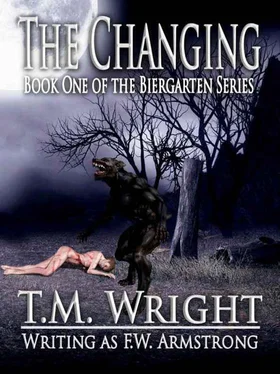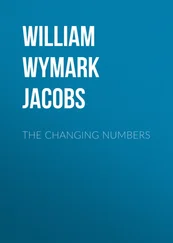T. Wright - The Changing
Здесь есть возможность читать онлайн «T. Wright - The Changing» весь текст электронной книги совершенно бесплатно (целиком полную версию без сокращений). В некоторых случаях можно слушать аудио, скачать через торрент в формате fb2 и присутствует краткое содержание. Жанр: Ужасы и Мистика, на английском языке. Описание произведения, (предисловие) а так же отзывы посетителей доступны на портале библиотеки ЛибКат.
- Название:The Changing
- Автор:
- Жанр:
- Год:неизвестен
- ISBN:нет данных
- Рейтинг книги:5 / 5. Голосов: 1
-
Избранное:Добавить в избранное
- Отзывы:
-
Ваша оценка:
- 100
- 1
- 2
- 3
- 4
- 5
The Changing: краткое содержание, описание и аннотация
Предлагаем к чтению аннотацию, описание, краткое содержание или предисловие (зависит от того, что написал сам автор книги «The Changing»). Если вы не нашли необходимую информацию о книге — напишите в комментариях, мы постараемся отыскать её.
The Changing — читать онлайн бесплатно полную книгу (весь текст) целиком
Ниже представлен текст книги, разбитый по страницам. Система сохранения места последней прочитанной страницы, позволяет с удобством читать онлайн бесплатно книгу «The Changing», без необходимости каждый раз заново искать на чём Вы остановились. Поставьте закладку, и сможете в любой момент перейти на страницу, на которой закончили чтение.
Интервал:
Закладка:
The movie that Tammy Levine was going to see was being shown at one of The Park's five theaters. Getting to it from the building where she worked required a long and dreary walk through Building Nine's subbasement corridors. It was, Tammy had once told a friend, like walking through the inside of a weird kind of cereal box. The walls were close enough to touch with both hands at once, the ceiling so low that it sparked claustrophobia, and the lighting dismal at best. She'd made the walk at least a hundred times since coming to Kodak Park, and each time she'd told herself that yes, at last she was getting used to it. And each time she knew it was a lie. That she'd never get used to it.
Which, thanks to the thing walking the corridor with her that afternoon, was tragically correct.
~* ~
She had long ago begun talking to herself on her walks through Building Nine's subbasement corridors. She had a high-pitched but pleasant voice, and today, with thoughts of Burt Reynolds in her head, she said to herself, "Burt, baby, what I wouldn't do to you if I got you alone." She was going to say more, because she usually did-she usually lost herself in a string of amazing sexual daydreams-but the thing that was walking the corridor with her, several yards behind, let forth with a small half growl, half grunt that echoed loudly on the smooth walls. Tammy Levine stopped walking. She said, at a whisper, "Get away from me, okay?!" She had no idea what she was talking to, or even if it understood what she was saying; she had a vague idea that one of The Park's nighttime patrol dogs had gotten loose, although that was unlikely. The dogs were used only in Building Twelve, a high-security area, and were allowed out only for emergency trips to a veterinarian, or when Death paid them a visit.
Death was paying Tammy Levine a visit that afternoon. She had a vague idea that it was true; something in the half grunt-half growl, something desperate and unreasoning, had told her it was true.
"Get away from me," she said again, "and I mean it!" She thought she sounded pretty pathetic. She didn't want to sound pathetic, she wanted to sound like she was in control, even in charge. But the thing behind her in the cereal-box corridor let go with another half growl and grunt, but louder, and longer. And Tammy ran.
She got ten feet before the thing caught up with her and tore most of her throat away. The last image that flashed across her consciousness was Burt Reynolds's face, which made her smile a little. She would keep that image forever.
And Building Nine's subbasement corridor walls would, even after an extensive cleanup, hold traces of her blood for a very long time.
Chapter Three
Ryerson H. Biergarten-his friends called him "Rye"-had the body of a long-distance runner, a face that was invariably described as "sexy," or "intriguing," or both, and he dressed in a way that the first of his two divorced wives called "poor man's preppy"-in faded, no-name jeans or corduroys, battered yellow or brown cardigan sweaters, argyle socks, penny loafers, and well-worn blue, cream-colored or green button-down shirts. ("It's clear, Rye," his first wife told him, "that you don't give a damn what you look like." He had readily agreed.) He had a full head of reddish-brown hair, usually in need of cutting or combing, and his gray-green eyes almost always had a spark of humor in them. He had also, in the past few weeks, taken to carting around a snorting Boston bull terrier pup he'd named Creosote. He called the dog Creosote because he'd found it in a smokehouse behind a two-hundred-year-old farmhouse in Vermont. Ryerson had been in the house looking for several of its previous tenants-a man in his nineties who did lots of cursing at odd hours and a young woman of twenty or twenty-one who had a fetching smile and wonderful green eyes; she liked to lounge on a huge, Victorian-style sofa in the parlor and say suggestive things to the house's male visitors. Both of these previous tenants were dead. The man in his nineties had died a hundred and ten years earlier, according to the county hall of records, and the woman had died, at her lover's hands, early in the twentieth century. Her name had been Gwendolyn, and the man's name had been Mr. Barclay.
Ryerson did not go to the house convinced of anything. He was, by nature, a skeptical person and was ready to find any of a number of answers, the most likely being, he guessed, that the owners of the house had cooked the whole thing up to draw visitors in. The owners, a group of five area businessmen, charged two dollars a head for people to walk through what they called "A living piece of America's heritage." Ryerson believed firmly in the supernatural, and he believed just as firmly in its various and usually unpredictable effects on the world of the living. He also believed, perhaps even more firmly, in the potential for greed and ignobility inherent in everyone (including himself-though, at the age of thirty-eight, he liked to think that he hadn't yet fallen to too much greed, or too much ignobility).
He talked to each of the five businessmen first. He asked them pointed questions about what they'd heard and seen, the same question several times, from different perspectives, trying to catch any of them in a lie. And when he was done, his own very well-developed sixth sense told him that there was a little bit of hoax, a little bit of truth, and a lot of colorful exaggeration involved in the whole thing. Whether there was anything actually supernatural happening at the house was a judgment he would put off until he'd been through it.
He went there on a Monday, the day the house was closed to visitors, and to his surprise-and without much effort-he found the two ghosts he'd been hired to find. It was late afternoon, the day was dismal and rainy, and the young woman, Gwendolyn, was in her usual place on the huge Victorian sofa in the parlor. She was, as Ryerson liked to say, "flickering"-her image waxing and waning like the light of a candle. Her suggestive words waxed and waned in the same way.
"Hi," she said when Ryerson walked into the room.
"Hi," he said.
"Would you"-her image waned; her words grew inaudible-"me?"
"I'm sorry," Ryerson said. He had stopped in the doorway. He didn't want to go any farther. The truth was that, although he'd investigated several hundred "events," as he called them, he had never been able to push back the loud whisper of fear. He'd tried smiling, coughing, whistling, he'd tried thinking about Yogi Berra, he had tried logic (My God, this poor creature is lost, and I'm here to help it!), but still the fear remained. No matter that Gwendolyn, when he could see her, was probably the most delightful and sensuous of all the ghosts he'd encountered; she was still a ghost, so she made his stomach flutter, and started a hard knot of panic in his throat.
"I want you to take your pants off," Gwendolyn said, then faded once more. When she reappeared-she was lounging with her legs up on the Victorian sofa and was dressed in an extremely low-cut red floor-length gown-Ryerson asked, "What good would that do?"
This confused her. Her brow furrowed, she glanced down at the floor briefly. When she looked up, she was smiling happily, as if she'd discovered something that had been missing for a long time. She said, "Well, we could diddle with…" the rest of the sentence was inaudible, but Ryerson thought he understood the gist of it.
"How?" he asked.
She faded, returned, faded. She swung her feet to the floor; Ryerson was a little troubled by the total silence that accompanied her bodily movements. He'd encountered the phenomenon a lot with "the others," as he called them, but it too was something he'd never grown used to.
"How what?" she asked at last.
"How could we ‘diddle' with each other?"
Читать дальшеИнтервал:
Закладка:
Похожие книги на «The Changing»
Представляем Вашему вниманию похожие книги на «The Changing» списком для выбора. Мы отобрали схожую по названию и смыслу литературу в надежде предоставить читателям больше вариантов отыскать новые, интересные, ещё непрочитанные произведения.
Обсуждение, отзывы о книге «The Changing» и просто собственные мнения читателей. Оставьте ваши комментарии, напишите, что Вы думаете о произведении, его смысле или главных героях. Укажите что конкретно понравилось, а что нет, и почему Вы так считаете.












